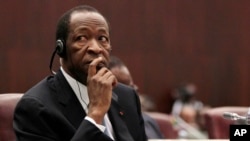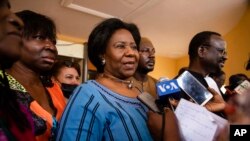Burkina Faso’s ex-president, Blaise Compaore, has been sentenced to life in prison for the 1987 assassination of predecessor Thomas Sankara. The ruling is seen by many as a symbolic victory for a region that has been mired by instability in recent years.
The trial of Compaore and his co-defendants began last October — more than 34 years after Sankara’s death.
Of the 14 men prosecuted, three were acquitted while the others received sentences ranging from three years to life in prison.
The defendants were prosecuted on charges of attacking state security, the concealment of a corpse and complicity in murder.
Throughout the six-month trial, hundreds testified about the plot to take down Sankara and his team.
The late President Sankara spoke out frequently against Africa’s colonial powers and was considered a revolutionary pan-African icon.
He and a dozen others were gunned down in October 1987 at a meeting of the National Revolutionary Council in the capital, Ouagadougou.
Compaore, who was a close friend of Sankara, has long been suspected of orchestrating the killings, although he has continuously denied the allegations. After Sankara’s assassination, he assumed the presidency and remained in power for 27 years. During that time, he took on an authoritarian role and suppressed inquiries into the circumstances of Sankara’s death.
Compaore was overthrown in 2014 and fled to Ivory Coast, where he has lived in exile ever since. He was tried in absentia.
Compaore’s lawyers announced last week he would boycott the trial. The proceedings were rife with irregularities, they said, and Compaore should benefit from immunity as a former head of state.
“Beyond the feeling of relief is the hope that is being reborn in Burkina Faso. It’s the hope that is being reborn in Africa,” said Bénéwendé Stanislas Sankara, the Sankara family lawyer. “To know that no one is untouchable. Everyone can be held to account; the law is the same for everyone.”
The trial took place amid a backdrop of military takeovers throughout the region, including a January coup in Burkina Faso that briefly interrupted the proceedings.
That the current military rulers have allowed the trial to proceed is a victory on its own, said Anta Guissé an international criminal lawyer who worked on the Sankara family’s legal team.
“The fact that the trial went through the end and that a judgment has been issued — it is a win,” she said. “After the coup in Ouagadougou, we were not sure that the trial could go through to the end. It’s also a win in terms of saying that justice is independent.”
Guissé said she does not expect the Ivorian government to extradite Compaore to Burkina Faso to serve his sentence.





